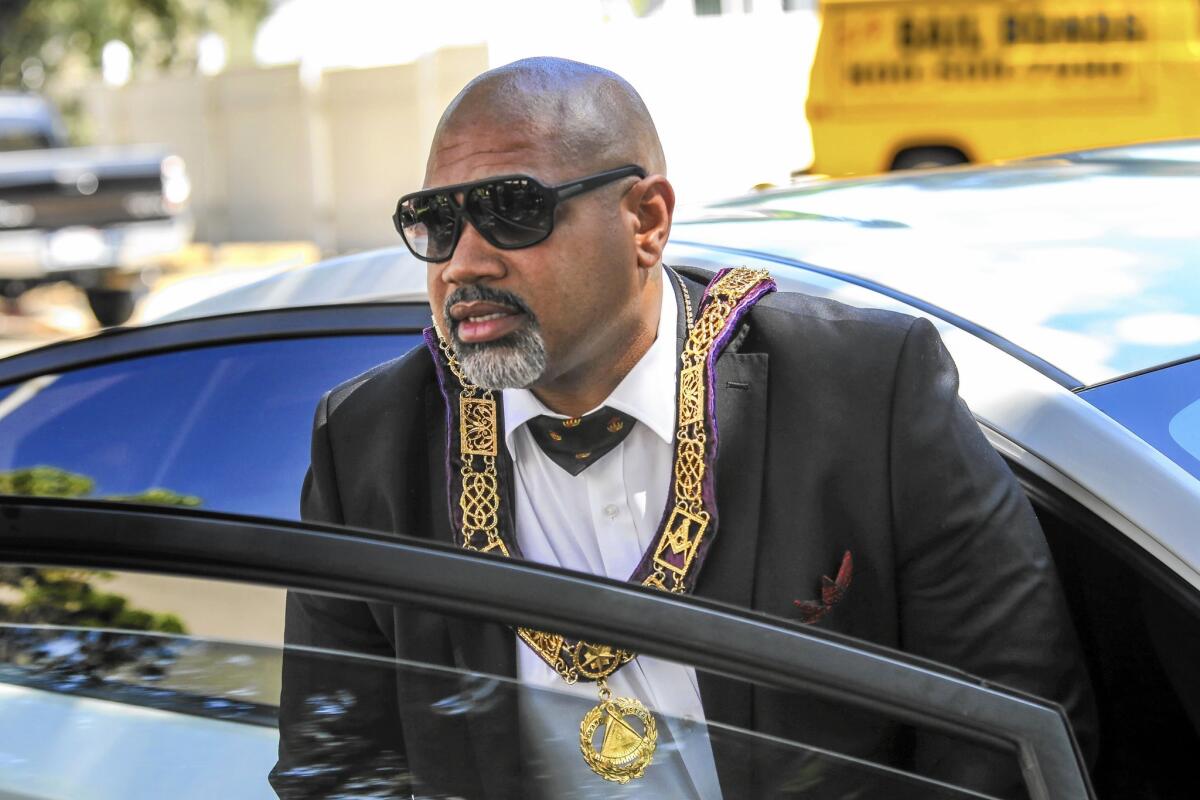Case against 3 who ran fake police force collapses; phony chief dies

David Inkk Henry, 47, alleged grandmaster of the bogus Masonic Fraternal Police Department, died Monday after appearing in a San Fernando courtroom. A judge dismissed charges against another man.
The case against three people accused of operating the bogus Masonic Fraternal Police Department — a supposedly ancient force that claimed to work in 33 states and Mexico — partly collapsed on Monday when the charges against one defendant were dismissed and the organization’s so-called chief suddenly died.
Hours after he appeared in a San Fernando courtroom, David Inkk Henry, the 47-year-old “grandmaster,” died of a pulmonary embolism at Henry Mayo Newhall Memorial Hospital, attorney Gary Casselman said.
Earlier in the day, L. A. County Superior Court Judge Hayden Zacky had granted a motion to dismiss the charges against Brandon Kiel, a former community affairs staffer with the California Department of Justice whom authorities said had impersonated a police officer and misused his government-issued ID.
The developments drastically altered a case that grabbed headlines when Henry, Kiel, and Tonette Hayes were arrested last spring — and left Casselman wondering why the charges had been brought to begin with.
Police “could have told Mr. Henry and Ms. Hayes and Mr. Kiel, ‘Listen, this is not a good idea. Someone might think you are impersonating a police officer,’” Casselman said. “I think [police] are jealous of anyone who might be perceived as an interloper or, pardon the expression, a competitor.”
Much of the notoriety derived from Kiel’s role within Atty. Gen. Kamala D. Harris’ administration, as well as the bogus police force’s eccentric online presence, including a website in which its members claimed to descend from the Knights Templar. Social media accounts associated with Henry also referred to secret societies such as the Freemasons and Illuminati, adding to the intrigue.
Los Angeles County sheriff’s officials said the trio walked into the Santa Clarita station last year — two of them wearing police uniforms — to announce their organization was setting up shop in the area.
“It just raised my suspicion level,” sheriff’s Capt. Roosevelt Johnson said at the time.
The department launched an investigation and learned the group had sent letters to area law enforcement, including police departments in Torrance and Santa Monica.
Investigators staged an undercover operation last April in which they recorded the group’s meeting with Santa Monica police Chief Jacqueline Seabrooks. A sheriff’s detective posed as Seabrooks’ assistant, according to testimony at a preliminary hearing.
Det. Amalia Hernandez testified that during the meeting, Kiel did much of the talking and said the group would not handle 911 emergency calls, only matters internal to the Masonic groups. Kiel also said the state Department of Justice was well aware and supportive of the Masonic Fraternal Police Department, according to Hernandez’s testimony.
The trio initially were charged with misdemeanor counts of falsely representing themselves as police officers; Henry also was charged with three felony counts of perjury. Prosecutors later accused the three of perjury and conspiracy to commit perjury by procuring fee-exempt license plates from the state Department of Motor Vehicles.
But the charges against Kiel gradually were pared down. At a preliminary hearing in January, all but four counts against him were dismissed, but L.A. County Superior Court Judge Monica Bachner let stand the misdemeanor counts of perjury and conspiracy to commit perjury.
In arguing to have the remaining charges dismissed, Kiel’s lawyer said that detectives had conducted an improper search of his client’s personal computer and that evidence found on it should be dropped.
Casselman contended that the search warrant used in the probe did not cover Kiel’s vehicle, a Ford Mustang issued by the state for use by Department of Justice employees, or his laptop, which was found in the car. The attorney said that even if the search of Kiel’s Mustang was valid, law enforcement could not search the computer since it violated the 4th Amendment.
“There was no consent,” Casselman said. “They could have applied for a warrant. But they didn’t do that.”
Deputy Dist. Atty. Brian Chang disagreed, arguing in court papers that Kiel did not have a “reasonable expectation of privacy” in his state-issued vehicle. Chang did not respond to a message seeking comment after the judge dropped the charges.
Kiel had been placed on paid leave after he was arrested. A Department of Justice spokeswoman confirmed Monday that he was no longer employed there. His attorney said his client was hopeful to move on and is now pursuing graduate studies.
“His life has been turned upside down,” Casselman said. “I don’t know if he’ll get his job back, but hopefully he can clear his name.”
Twitter: @MattHjourno
ALSO
Marine killed outside San Bernardino strip club identified
Woman arrested on suspicion of murder after crash that killed 1 and injured 8
LAPD chief testifies in civil trial, denies he unfairly passed captain over for promotion
More to Read
Start your day right
Sign up for Essential California for news, features and recommendations from the L.A. Times and beyond in your inbox six days a week.
You may occasionally receive promotional content from the Los Angeles Times.







